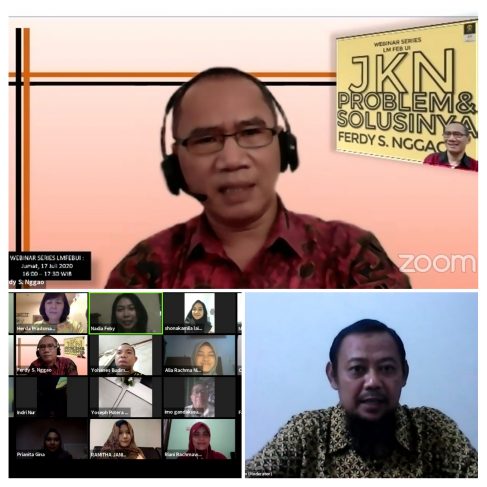LM FEB UI’s Webinar Series: The Problems of JKN and the Solutions
Nino Eka Putra ~ FEB UI Public Relations Officer
DEPOK, (17/7/2020) – Social security is the realization of state responsibility for the welfare of its people through social protection to ensure that people can meet their basic needs for a decent life. The social security regulatory framework is contained in the 2nd and 5th principles of Pancasila, the 1945 Constitution, People’s Consultative Assembly Decision (TAP MPR RI) No. X/MPR-RI / 2001, SJSN Law No.40/2004, and BPJS Law No.40/2011.
There are two models of social security financing. The first is social assistance (full financing by state and regional budgets (APBN/APBD), which is regulated in Law No.40 of 2004 on the National Social Security System. The second is social insurance (funding from contributions/ contributions and APBN/APBD). Social security is based on the principles of mutual assistance, non-profit, openness, prudence, accountability, portability, mandatory membership, trust funds, and the use of revenue from fund management for program development and the best interests of the participants.

“The main targets of social security are the upper and middle income groups (such as saving, time deposit, commercial insurance, pension funds, financial institutions and businesses), and the low income group (social security). Meanwhile, as the government pays for the contributions of most of National Health Insurance (JKN) members, the introduction of new tariffs increased the government’s burden,” said Ferdinandus Sentosa Nggao, Senior Consultant at the Management Institute, Faculty of Economics and Business, Universitas Indonesia (LM FEB UI), in a webinar series entitled The Problems of JKN and the Solutions, Friday (17/7/2020). The webinar was moderated by Catur Prasetyo.
In the past, JKN caused a deficit due to a mismatch in expenditure and revenue. However, the deficit suffered by BPJS Kesehatan does not mean JKN has failed, as long as there is no fund embezzlement, members pay their contributions and receive services accordingly, the state is unable to provide bailout fund. Overcoming the deficit requires adjustments to tariffs and benefits, government bailout, and cost sharing.
“The contributions are set at the lowest benchmark. Problems often occur related to contributions from independent participants, whose contributions are calculated individually, unlike employers who have five workers who pay for their own contributions, in contrast with workers whose contributions are 80% paid by their companies; registration of all family members, the fact that people are not yet insurance minded, and the need to move on from the social assistance model,” Ferdinandus noted.
To enrol their workers with JKN, companies should submit a report to a BPJS Kesehatan branch office where they (employers) are registered. The report is completed with documents proving dismissal, data on dismissal of participants, and other documents that meet the criteria for dismissal. A report is considered valid if BPJS Kesehatan gives a written approval for the dismissal of workers.
Workers who have been dismissed by their employers should apply for reactivation of JKN membership with BPJS Kesehatan. The application should be completed with ID card, family card, and BPJS card, as well as a duty stamped statement that the participant is unemployed. Furthermore, participants should report every month and failure to do so will result in membership termination. The membership will be reactivated if participants submit another report. Participants’ rights expire six months after dismissal or if they are re-employed. If after six months participants are still unemployed, they can register as recipients of contribution assistance (PBI).
“BPJS Kesehatan should improve service performance in terms of cost control, fraud prevention, settlement of arrears to hospitals, membership data, coordination of benefits, hospital services for information on room availability, quotas, billing, compliance, membership coverage, socialization, information systems, and human resources capacity,” said Ferdinandus.
Thus, government interference is highly expected in the short term to make JKN a budget priority during the crisis, to allocate bailout fund, and anticipate an increase in PBI due to the economic crisis, facilitate the use of supply chain financing mechanisms, organize or compile PNPK (National Guidelines for Medical Services), improve data, improve capitation funding mechanism, optimize coordination of benefits), and optimize the role of local governments.
For the long term, alternative funding outside contributions, policy mix related to the implementation of JKN (price and distribution of drugs/health, health industry policies), health facilities (accreditation of hospitals so as not to disadvantage participants, equitable provision of health facilities), and public outreach in terms of promoting the principles of mutual cooperation and social insurance, compliance with payment obligation coupled with applicable rules, promotion of healthy living habits, and a mutually agreed upon formula for contribution calculation (such as minimum wage). (hjtp)




